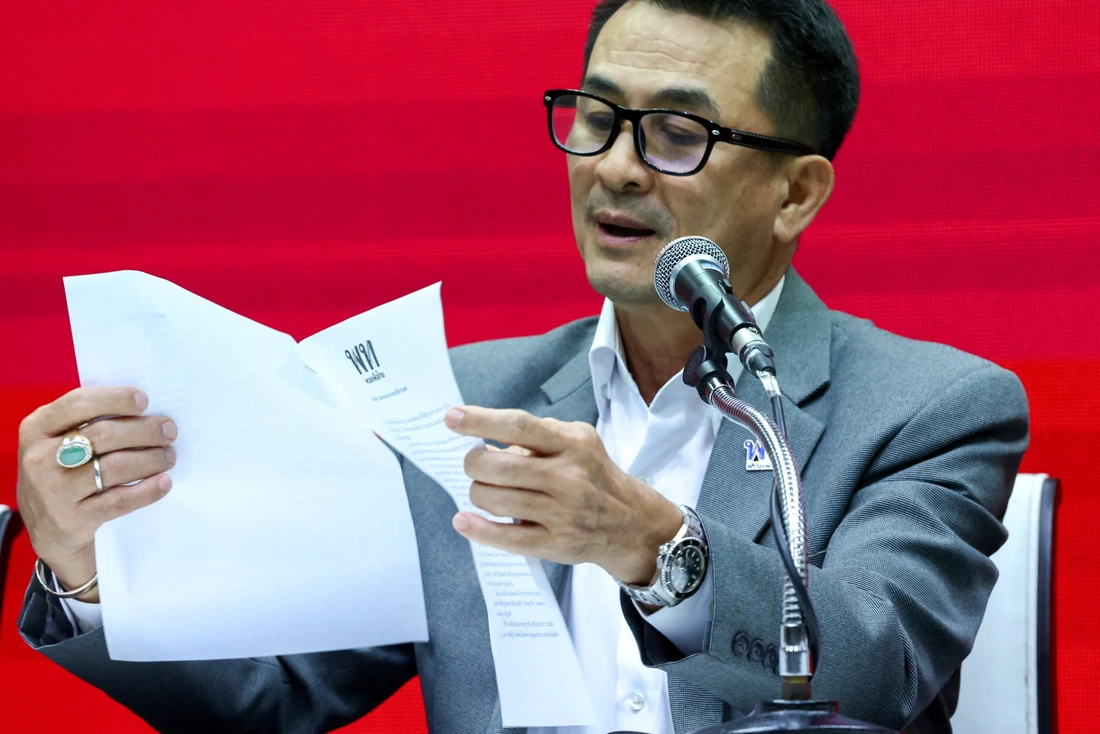After dissolving the eight-party pro-democracy coalition that included Move Forward, the progressive party that won the most seats in Thailand's recent election, Pheu Thai, the party with the second most seats, has now formed a coalition government with itself at the helm, collaborating with several smaller parties. Pheu Thai has put forward Srettha Thavisin, a wealthy former CEO of a major real estate company with little political experience, as their candidate for prime minister.
With Move Forward now relegated to the opposition, it is highly likely that Srettha will be confirmed as prime minister. Unlike Move Forward's leader, who had the initial chance to form a coalition, Srettha does not support changing the draconian lese-majeste 112 law, which prohibits criticism of the monarchy. His adherence to the status quo makes him acceptable to the 250 military-appointed senators who constitute the upper house of parliament. Their refusal to vote for the initial eight-party coalition led to its downfall. Even though the Move Forward coalition held a majority in the 500-person lower house, leader Pita Limjaroenrat needed a combined 376 votes from the upper and lower houses to become prime minister. This requirement grants significant power to the conservative, military-appointed senators in shaping the composition of parliament.
For nearly two decades, Pheu Thai was known as the party championing democracy and economic equality in Thailand, with its prime ministers ousted in coups on two occasions. During Thaksin Shinawatra's tenure as prime minister, the party introduced a series of populist policies, such as universal health care, which brought crucial benefits to Thailand. However, Thaksin's own commitment to democracy was questionable at times, given his oversight of extrajudicial killings in southern Thailand, intimidation of the press, and attempts to influence other institutions. Nonetheless, Pheu Thai was generally considered the primary pro-democracy party for two decades. Nevertheless, it was always pragmatic and did not vigorously advocate for major institutional changes, like lese-majeste reform, which are gaining popularity in Thailand.
By discarding Move Forward and forming a coalition with older and relatively conservative parties, Pheu Thai may have sacrificed its reputation as the party of democracy, even though it will now govern. This move sparked protests by younger Thais who demonstrated outside Pheu Thai's offices and burned effigies of the party's leaders in response to the announcement. Pheu Thai will likely be viewed, especially by younger Thais, as just another part of the Thai establishment, which has long disregarded the popular will.
With Move Forward now relegated to the opposition, it is highly likely that Srettha will be confirmed as prime minister. Unlike Move Forward's leader, who had the initial chance to form a coalition, Srettha does not support changing the draconian lese-majeste 112 law, which prohibits criticism of the monarchy. His adherence to the status quo makes him acceptable to the 250 military-appointed senators who constitute the upper house of parliament. Their refusal to vote for the initial eight-party coalition led to its downfall. Even though the Move Forward coalition held a majority in the 500-person lower house, leader Pita Limjaroenrat needed a combined 376 votes from the upper and lower houses to become prime minister. This requirement grants significant power to the conservative, military-appointed senators in shaping the composition of parliament.
For nearly two decades, Pheu Thai was known as the party championing democracy and economic equality in Thailand, with its prime ministers ousted in coups on two occasions. During Thaksin Shinawatra's tenure as prime minister, the party introduced a series of populist policies, such as universal health care, which brought crucial benefits to Thailand. However, Thaksin's own commitment to democracy was questionable at times, given his oversight of extrajudicial killings in southern Thailand, intimidation of the press, and attempts to influence other institutions. Nonetheless, Pheu Thai was generally considered the primary pro-democracy party for two decades. Nevertheless, it was always pragmatic and did not vigorously advocate for major institutional changes, like lese-majeste reform, which are gaining popularity in Thailand.
By discarding Move Forward and forming a coalition with older and relatively conservative parties, Pheu Thai may have sacrificed its reputation as the party of democracy, even though it will now govern. This move sparked protests by younger Thais who demonstrated outside Pheu Thai's offices and burned effigies of the party's leaders in response to the announcement. Pheu Thai will likely be viewed, especially by younger Thais, as just another part of the Thai establishment, which has long disregarded the popular will.
To its credit, Pheu Thai has refused to include openly pro-military parties in its coalition, although this is a feeble gesture since Pheu Thai did not require the support of those smaller parties to form a government. Pheu Thai has also promised to hold a referendum on whether to create a new constitution. If Thais vote in favor of a new constitution, Pheu Thai claims it will dissolve parliament. However, there is skepticism about whether Pheu Thai, while in power and with Thaksin's imminent return to Thailand, will actually carry out such a referendum, especially considering the potential reconciliation between Thaksin and the establishment and monarchy.
These are minor positive steps indicating that Pheu Thai may recognize the negative perception of its actions among many Thai democrats and that it is attempting to demonstrate its commitment to a vision of Thai democracy.
Nonetheless, numerous Thais, particularly the younger generation, have moved beyond Pheu Thai's gradual approach (although the referendum would represent a significant change) and demand sweeping institutional reforms across all aspects of Thai society, including the monarchy. This is why, despite initial polls predicting Pheu Thai's dominance in the election, the party performed poorly. The younger voters who supported Move Forward represent the future of Thai politics.
These are minor positive steps indicating that Pheu Thai may recognize the negative perception of its actions among many Thai democrats and that it is attempting to demonstrate its commitment to a vision of Thai democracy.
Nonetheless, numerous Thais, particularly the younger generation, have moved beyond Pheu Thai's gradual approach (although the referendum would represent a significant change) and demand sweeping institutional reforms across all aspects of Thai society, including the monarchy. This is why, despite initial polls predicting Pheu Thai's dominance in the election, the party performed poorly. The younger voters who supported Move Forward represent the future of Thai politics.





